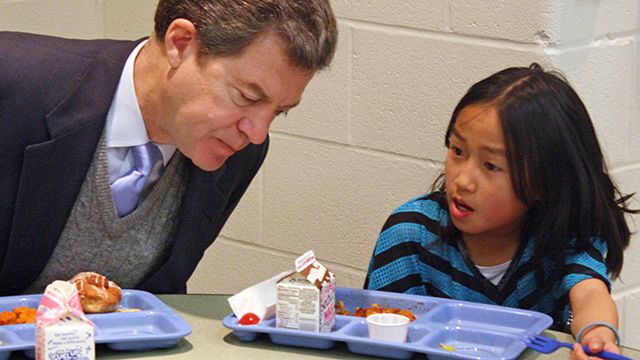
What’s the matter with Kansas? Quite a bit, according to Tavis Smiley. Starting with Governor Sam Brownback, who has been speaking out of one side of his mouth about morality, while at the same time passing a budget — “a moral document” — that denies more than 135,000 Kansas children who live in or near poverty sufficient food, safe shelter and solid schools. “It’s tragic,” Smiley said. “I think what he has done is shameful and disgraceful.”
Perhaps the most tragic thing that Governor Brownback has done is authorize tax breaks to the wealthiest Kansans that require drastic cuts to just about every state program that offers those living in poverty a decent shot at working their way out of it. His 2012 tax cuts rank among the largest ever enacted by a state: they reduce income taxes for the state’s richest earners by 25 percent, eliminate taxes on all business profits reported as individual income and have already cost the state $338 million in revenues.
Earlier this month, Smiley addressed the 2014 Kansas Conference on Poverty, and noted that the state is far from alone. Across the country, the Great Recession brought to a head decades of wage stagnation for working Americans and rapidly rising income inequality between the rich and the rest. The minimum wage hasn’t seen a raise since 2009, and it is now worth 23 percent less, in real dollars, than peak inflation-adjusted value in 1968. Nearly one in three Americans currently lives at, below, or near the poverty line, and concentrated poverty is on the rise. In 2007, the 400 richest Americans had more wealth than the 150 million people at the bottom.
But what went on in Kansas last week also reflects an important step in the right direction. Over 350 nurses, police officers, social workers, housing experts, educators, foundation and business leaders, and policy makers gathered in the state’s capitol to say “enough is enough.” We called out policies that contribute to rising income inequality and poverty. We connected the dots between poverty and poor educational outcomes, excessive incarceration, rising homelessness and many other social ills. We calculated their cost to budgets and human beings; we grappled with the reality that America pays far more for poverty than we would to substantially increase the minimum wage.
We watched Paycheck to Paycheck, an Emmy-nominated HBO documentary about Katrina Gilbert, a single mother of three struggling to secure her children’s future on a $9.49 per hour job at a nursing facility. We saw how Chattanooga’s high-quality, 24-7 child care facility, one of just three in the entire country, made that future at least a possibility. We were witness to Katrina’s inability to treat her chronic thyroid problem and a sinus infection until her Earned Income Tax Credit check arrived. “I’ve had a headache every day for months,” she noted, casually, as she left three prescriptions unfilled, because they were too expensive. We listened to her debate whether to use the remainder of that check to finalize her divorce or pay off her car. These are the kinds of “choices” that no American, especially one who works as incredibly hard as she does, should face.
Anti-poverty advocates in Kansas and across the country stand with Smiley in asserting that poverty is the defining issue of our time. It threatens the very foundations of our democracy. Children who are denied an equitable, enriching education have little chance of growing into the informed, engaged citizens who must lead our country. Adults who are consumed by the need to put food on their children’s plates and keep a roof over their heads cannot engage in the information-gathering and discourse needed to sustain that democracy. And the concentration of money, and power, in the hands of such a tiny fraction of our electorate drowns out their voices.
We share Smiley’s outrage at our national and state leaders’ refusal to see these realities, let alone address them. As he indignantly noted, “there is a highway into poverty in this country, but only a sidewalk out of it.” Our collective job is to reverse that reality, to make it hard to fall into poverty, but easy, with the right tools, to climb out.
It’s high time for a new War on Poverty. We can start by making sure that we all #TalkPoverty in our communities, our jobs, and our schools, every day. We can work toward an anti-poverty contract that addresses minimum wages, paid sick leave for all workers, affordable and safe childcare, ending child hunger, and ensuring that no one willing to work becomes destitute. And we can join Smiley in demanding that the next candidates for US President devote one of the three 2016 presidential debates – just 90 minutes of their time – to explaining how they will take part in this work. Smiley is right: “America is not yet as good as its promise.” It’s time for all of us to fight for that promise, before it’s too late.
The views expressed in this post are the authors’ alone, and presented here to offer a variety of perspectives to our readers.



